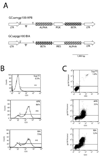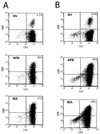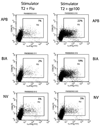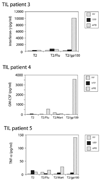High efficiency TCR gene transfer into primary human lymphocytes affords avid recognition of melanoma tumor antigen glycoprotein 100 and does not alter the recognition of autologous melanoma antigens
- PMID: 12960359
- PMCID: PMC2248799
- DOI: 10.4049/jimmunol.171.6.3287
High efficiency TCR gene transfer into primary human lymphocytes affords avid recognition of melanoma tumor antigen glycoprotein 100 and does not alter the recognition of autologous melanoma antigens
Abstract
The alpha- and beta-chains of the TCR from a highly avid anti-gp100 CTL clone were isolated and used to construct retroviral vectors that can mediate high efficiency gene transfer into primary human lymphocytes. Expression of this TCR gene was confirmed by Western blot analysis, immunocytometric analysis, and HLA Ag tetramer staining. Gene transfer efficiencies of >50% into primary lymphocytes were obtained without selection for transduced cells using a method of prebinding retroviral vectors to cell culture vessels before the addition of lymphocytes. The biological activity of transduced cells was confirmed by cytokine production following coculture with stimulator cells pulsed with gp100 peptides, but not with unrelated peptides. The ability of this anti-gp100 TCR gene to transfer high avidity Ag recognition to engineered lymphocytes was confirmed in comparison with highly avid antimelanoma lymphocytes by the high levels of cytokine production (>200,000 pg/ml IFN-gamma), by recognition of low levels of peptide (<200 pM), and by HLA class I-restricted recognition and lysis of melanoma tumor cell lines. CD4(+) T cells engineered with this anti-gp100 TCR gene were Ag reactive, suggesting CD8-independent activity of the expressed TCR. Finally, nonmelanoma-reactive tumor-infiltrating lymphocyte cultures developed antimelanoma activity following anti-gp100 TCR gene transfer. In addition, tumor-infiltrating lymphocytes with reactivity against non-gp100 melanoma Ags acquired gp100 reactivity and did not lose the recognition of autologous melanoma Ags following gp100 TCR gene transfer. These results suggest that lymphocytes genetically engineered to express anti-gp100 TCR may be of value in the adoptive immunotherapy of patients with melanoma.
Figures







References
-
- Jager E, Gnjatic S, Nagata Y, Stockert E, Jager D, Karbach J, Neumann A, Rieckenberg J, Chen YT, Ritter G, et al. Induction of primary NY-ESO-1 immunity: CD8+ T lymphocyte and antibody responses in peptide-vaccinated patients with NY-ESO-1+ cancers. Proc. Natl. Acad. Sci. USA. 2000;97:12198. - PMC - PubMed
-
- Marchand M, Weynants P, Rankin E, Arienti F, Belli F, Parmiani G, Cascinelli N, Bourlond A, Vanwijck R, Humblet Y, et al. Tumor regression responses in melanoma patients treated with a peptide encoded by gene MAGE-3. Int. J. Cancer. 1995;63:883. - PubMed
-
- Rosenberg SA, Packard BS, Aebersold PM, Solomon D, Topalian SL, Toy ST, Simon P, Lotze MT, Yang JC, Seipp CA, et al. Use of tumor-infiltrating lymphocytes and interleukin-2 in the immunotherapy of patients with metastatic melanoma: a preliminary report. N. Engl. J. Med. 1988;319:1676. - PubMed
-
- Walter EA, Greenberg PD, Gilbert MJ, Finch RJ, Watanabe KS, Thomas ED, Riddell SR. Reconstitution of cellular immunity against cytomegalovirus in recipients of allogeneic bone marrow by transfer of T-cell clones from the donor. N. Engl. J. Med. 1995;333:1038. - PubMed
MeSH terms
Substances
Grants and funding
LinkOut - more resources
Full Text Sources
Other Literature Sources
Medical
Research Materials

